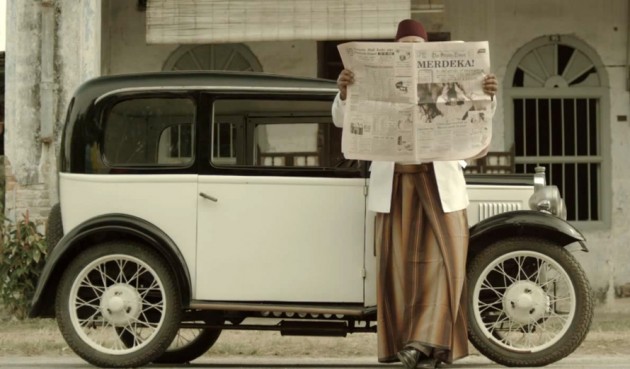RECENTLY, a former judge said only the Malays sacrificed their lives to fight the communists and this was the reason why "those who demanded independence were the Malays".
He claimed the Malays fought for independence to free the country while the non-Malays did it to safeguard their interests after independence.
Collectively, these statements reflect the former judge's ignorance – whether wilful or inadvertent – about the then Malaya's struggle for independence and the sacrifices all communities made during the Emergency.
He has also overlooked one incontestable fact – the British agreed to grant independence ONLY if the Malays, Chinese and Indians showed they could work together.
That the Malays demanded independence isn't disputed. Equally, indisputable, some Chinese and Indian leaders fought for independence – not because of vested interests – but because they didn't want to live under a colonial regime.
One such individual is my grandfather, the late Tun Tan Cheng Lock.
.jpg)
As early as 1926, Cheng Lock said "our ultimate political goal should be a united self-governing British Malaya."
He also called for "fostering and creating a true Malayan spirit and consciousness among its people to the complete elimination of racial and communal feeling."
Critics may argue Cheng Lock's proposal was for self-government, not independence. While this point is conceded, Cheng Lock's objective was far-sighted. In 1926, individuals living in this country thought of themselves as Malays, Chinese, and Indians rather than as Malayans.
Working towards self-government, nurturing a Malayan consciousness and eradicating racial sentiment – these were essential way stations on the road to independence.
In his inaugural speech at the Malayan (now Malaysian) Chinese Association (MCA) – an institution he founded in February 1949 – Cheng Lock said "One of the basic aims of the MCA is to help, in cooperation with the Malays and other communities, the development of the process of making the whole of Malaya one country, one people and one government."
After my grandfather passed away on Dec 13, 1960, in his condolence speech in Parliament, Tunku Abdul Rahman said: "If not for the great support and contributions rendered by the late Tun Tan Cheng Lock, I must admit that the struggle for independence for Malaya would not have succeeded."
Furthermore, the retired judge also overlooked one fact about the Emergency: on April 10, 1949, the communists threw a hand grenade at Cheng Lock in Ipoh.
Although his shoulder was pierced by shrapnel, he survived this attempted assassination.
Given the retired judge's worrying ignorance about this country's two significant events, the Education Ministry's decision, implemented last year, to make history a must-pass subject in the Sijil Pelajaran Malaysia (SPM) examination is, theoretically, a very welcome initiative.
Equally noteworthy, effective this year, history will be part of the core curriculum for primary school students.
Whether these two policies will succeed in nurturing Malaysia-centric students will depend on how history is taught. If the emphasis is on memorising a long list of dates and events, this will prevent students from appreciating other ethnic communities' contribution towards the making of Malaya and later Malaysia.
Also crucial is whether students will also be taught the 20th century and 21st century history of Asean countries as well as that of China, India, Japan, North Korea and South Korea.
History is the study of individuals, societies and countries and their actions throughout the centuries. Without this knowledge, it will be difficult to foster a better understanding between Malaysians and all those living in other Asean and Asian countries.
Because the causes of conflict and the reasons for a country's ascension to greatness or for their decline have remained unchanged for millennia, knowledge of the past is useful in planning for the future.
Students should also be encouraged to visit museums like the Memorial Kemerdekaan in Malacca.
While its conception is excellent, it is a pity the Memorial Kemerdekaan provides little information about the active involvement in the independence struggle of leaders like Cheng Lock and Tun V.T. Sambanthan.
Previously, the memorial showcased my grandfather's handwritten speeches. Today, for some inexplicable reason, this is no longer on display.

Arkib Negara Malaysia plans to build in Kuala Lumpur a Memorial Negarawan to highlight the contributions of leaders like Tun Dr Ismail Abdul Rahman, Cheng Lock, Sambathan, Tun Dr Lim Chong Eu, Tun Mohd Fuad Stephens and Tun Temenggong Jugah Anak Barieng.
Although I congratulate Arkib Negara for this commendable initiative, I have three concerns.
First, will Memorial Negarawan be built on an open tender basis? Second, will sufficient funds be allocated each year for its maintenance? Third, will it become a building that few care to visit – like Tunku's former house, the Residency?
George Santayana said: "Those who do not remember the past are condemned to repeat it." This is something individuals like the retired judge should note. -Sundaily




No comments:
Post a Comment
Note: Only a member of this blog may post a comment.